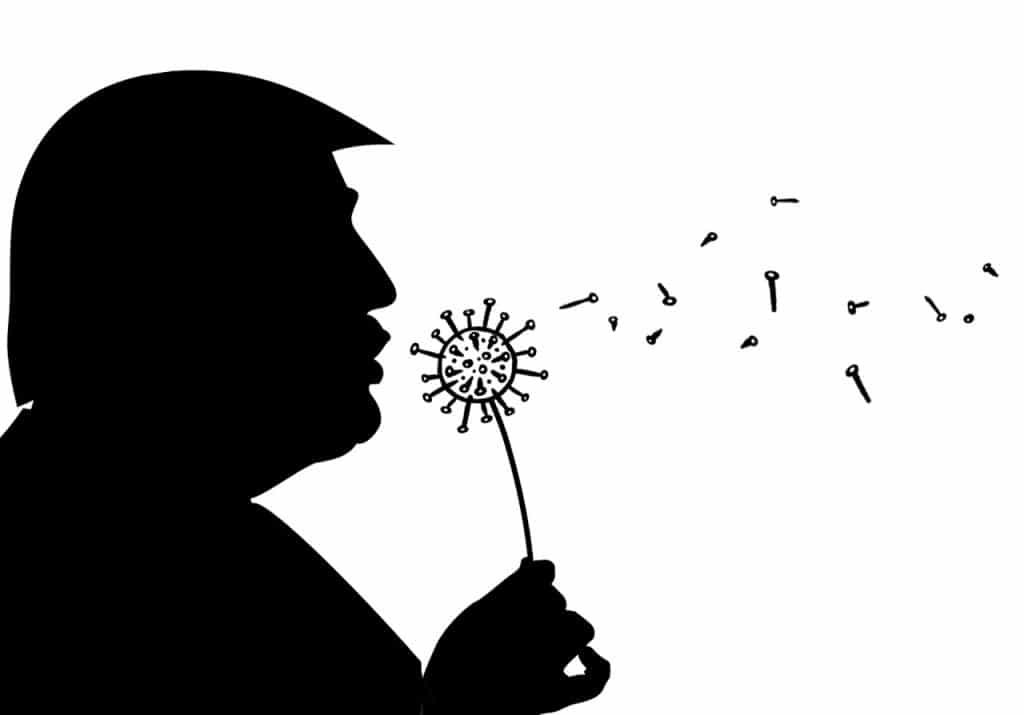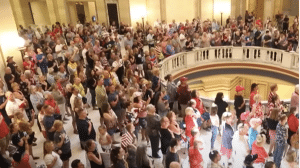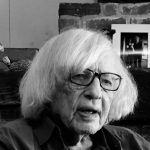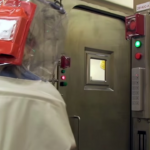Rejecting survival: How Trumpist denials of the COVID catastrophe impede recovery and renewal
By Robert Jay Lifton | August 24, 2021
 Illustration by Thomas Gaulkin (Freepik / Open Clipart)
Illustration by Thomas Gaulkin (Freepik / Open Clipart)
Catastrophes are always with us. There is a large historical—one might even say evolutionary—flow from relatively stable structures, to the social breakdown that comes with catastrophe, to survivors’ efforts at renewal. Such catastrophes include wars, nuclear attacks, Auschwitz-style killing factories, earthquakes, droughts, uncontrollable fires, widespread flooding, and now a lethal pandemic. With all of these catastrophes, survivors become crucial for reconstituting society.
But for societies to cope with catastrophe they must first recognize its existence. When large numbers of people reject an engulfing catastrophe, that society may become stagnant or it may become disrupted by violent conflict over the meaning of what they have experienced. Trumpists’ confused rejection of the COVID-9 pandemic is a case in point.
Why are survivors so important? I have come to view survivors as a special group with particular psychological characteristics. In my work in Hiroshima in 1962, I interviewed survivors of the first use of a nuclear weapon on a human population. They were known as hibakusha, meaning “explosion-affected people.” In giving my book on that work the title Death in Life, I was emphasizing the imprint of death on all survivors, whether of large events like the Hiroshima bomb or smaller ones like the death of a family member.
Survivors are mourners. They mourn for people they have lost but also for lost homes, streets, and possessions. They mourn for their lost former selves, for their innocence toward death. That mourning process can be urgent and protracted because it is so important for coping with death anxiety. Without it, death anxiety can dominate their lives and become an obstacle to renewal.
Survivors’ grief is bound up with an insistent quest for meaning. We humans are meaning-hungry creatures, and survivors deepen and extend that hunger. Their quest for meaning starts with their own physical and psychological needs but can extend to fundamental questions about the nature and source of the catastrophe they endured.

The significance of mourning in the face of collective catastrophe was expressed by two anti-Nazi psychoanalysts, Alexander and Margarete Mitscherlich, in their book The Inability to Mourn, published in Germany in 1967 and in English translation in 1975. The Mitscherlichs’ claimed that the German people had loved their Führer, but could not mourn his death or confront their loss because they came to recognize him as a source of evil in which they had actively or passively shared. They struggled with their “defense against guilt, shame, and anxiety,” which required “a considerable expenditure of psychic energy …to maintain this separation of acceptable and unacceptable memories.” Their inability to mourn resulted in widespread psychic numbing and the low-level depression I observed in some of the Nazi doctors I interviewed in my study of them. A further result, according to the Mitscherlichs’, was collective national stagnation.
Survivors of Hiroshima and Auschwitz sometimes conveyed to me a claim of special knowledge not available to others. That knowledge had to do with witnessing grotesque forms of death and undergoing equally grotesque suffering. It could also, despite everything, include a capacity to survive. In their travels throughout the world, Hiroshima hibakusha and Auschwitz survivors have not only told of their otherwise unimaginable experiences but also of their unlikely, even miraculous, emergence from them alive.
The novelist Jorge Semprun tells of a memory of Auschwitz that he had years later while in a pleasant setting by a wood fire. He found himself with “a piece of black bread in my hand,” which he bit into while continuing polite conversation:
Then, the slightly acid taste of the black bread, the slow mastication of this gritty black bread, brought back with shocking suddenness the marvelous moments when, at camp, we used to eat our ration of bread, when with Indian-like stealth, we used to stretch it out, so that the tiny squares of wet, sandy bread, which we cut out of our daily ration, would last as long as possible.
What he calls “marvelous moments” in the camp had to do with finding something on the order of the bread of life in those “tiny squares of wet sandy bread.” He was telling us that finding ways to reconstitute life is at the heart of survivors’ special knowledge.
Today, with COVID-19, we recognize the haunted survivors whose direct personal or family experience of the illness immerses them in death. They are the ones generally referred to as “COVID survivors.” But everyone else must cope with more muted death anxiety. This larger group is rightfully viewed as survivors because it too has been exposed to a lethal epidemic and remained alive.
But there are people from both of these groups who are confused and contradictory about the pandemic and who struggle with their own inability to mourn. They consist mostly of Trump’s loyal followers and like-minded rightists and conspiracists; they have lost a leader not through death but through the sudden end of his public omnipresence which had previously been sustained by social media (Twitter and Facebook) and the office of the presidency. What remains consistent for Trumpists is political pressure against recognizing the pandemic as a catastrophe. They cannot fully deny the virus’ danger but they find it necessary to reject the realization of its full measure.
Masks and vaccine injections become fraught. They are associated with intense political pressures and threatening death anxiety. Trumpists often denounce them, sometimes violently. Right-wing governors become killers when they insist on removing mask mandates and when they encourage vaccine resistance. And when some Trumpists compare mandatory masks with the Nazi requirement that Jews sew the star of David onto their clothing, they may be unconsciously responding to the death anxiety associated with both.
When struck by the illness themselves, some Trumpists break out of their negation and admit their death anxiety. There are also a number of cases in which people get the vaccine but do so in disguise, seeking to retain their political identity as Trumpist. Others are sufficiently constrained politically to go to their deaths rejecting the reality of the pandemic. Trump himself expressed this contradiction by suggesting that his people should take the vaccine while also declaring that “I believe in your freedoms 100 per cent”—meaning of course the freedom, even encouragement, not to take it.
Continuing to reject the full catastrophe, Trumpists cannot embrace or even recognize their survivor status. They are unable to participate in any form of survivor renewal.
Those who reject an actual catastrophe seem to require a substitute catastrophe of their own. They can embrace prior conspiratorial visions of “the genocide of white people,” the “great replacement” of bona fide Americans like themselves by Jews, and the need to promote the “lost cause” of the Civil War or at least of white supremacy. In that way, they make contact with a longstanding American anti-government paranoid style, now seeing themselves as victims of the “deep state.”
This enables them to see themselves as survivors after all and to take on a survivor mission, a lifelong commitment to active opposition to what they take to be the cause of the catastrophe. In their case the culminating survivor mission is to “stop the steal” and reinstall Trump as president, precisely the mission of the insurrectionists who attacked the Capitol on January 6. The big lie about the election becomes the final common pathway for these self-designated survivors. Their violence can diminish their death anxiety, at least temporarily. But their struggle with death anxiety underlies everything.
The psychological and the political are always intertwined, but never more excruciatingly than at the present moment. One result of this interaction can be a Trumpist inability to mourn, but an alternate pattern can be that of a constructive mourning process. That was the case with the large public ceremony orchestrated by the Biden administration on the eve of assuming the presidency. Such ceremonies can ease minds and enable more people to accept the truth of actual catastrophe. This kind of continuous interactive dynamic is sometimes called a “virtuous circle.” Such a life-affirming, political/psychological dynamic can be crucial to recovery from catastrophe.
Something new is taking place that may enhance this constructive dynamic. A recent New York Times article describes “survivors of COVID-19 and relatives of those who died from it are organizing into a vast grass-roots lobbying force that is bumping up against the divisive politics that helped turn the pandemic into a national tragedy.” They give themselves such names as Covid Survivors for Change, Young Widows and Widowers of Covid-19, and Survivor Corps. They are speaking, writing, and holding meetings in which they demand recognition of their suffering—calling for others to say: “We see you, we hear you, we stand with you, and we care.”
As with earlier movements involving disease or bodily attack—AIDS survivors and survivors of Hiroshima—these immediate COVID survivors begin with a focus on the need for greater help from society. But such survivor groups quickly become concerned with meaning. One of them is calling for a special commission to investigate the pandemic in order to help prevent its recurrence. Another group has proposed the establishment of a permanent COVID memorial day, specifying that it be held on the first Monday in March.
In this way immediate COVID survivors are beginning to bring their special knowledge to bear on the larger society. How their movement will develop is far from certain, as is the response of American society. But there is the hopeful possibility that this expression of survivor wisdom will resonate with the more muted COVID survivors who constitute most of our society. These movements could become a major force for reestablishing the historical flow of survivor-based renewal.
Together, we make the world safer.
The Bulletin elevates expert voices above the noise. But as an independent nonprofit organization, our operations depend on the support of readers like you. Help us continue to deliver quality journalism that holds leaders accountable. Your support of our work at any level is important. In return, we promise our coverage will be understandable, influential, vigilant, solution-oriented, and fair-minded. Together we can make a difference.
Keywords: Auschwitz, Holocaust, Trumpism, anti-vaxxers, catastrophes, group psychology, hibakusha, pandemic denial, survivors
Topics: Analysis, Biosecurity















It is extremely disappointing that the Bulletin is posting such political statements. Articles like these discredit the organization that is supposedly “scientific”. This article pushes the same political dribble as many other less credible news outlets. The political dribble detracts from the facts and is extremely divisive. Imagine how much more effective the article could be in “educating” “Trumpists” on the benefits of the vaccine if the article left out political labels and finger pointing. The bulletin has become another arm of divisive media.
Thank you Dr. Lifton and the Bulletin for this deeper analysis of the current political times we live in and how it effects us all on both a micro and macro level. As we dissect the cult like behaviors of Trumpists, the intransigence of the Republican Party, what is really striking is the lack of courage, highlighted by arrogance and ignorance that seems to prevail amongst too many leaders in government and industry, with frightening results for the planet. Yes, I’m taking a deep breath, as I tell my patients to do, as we recognize and acknowledge the pain and… Read more »